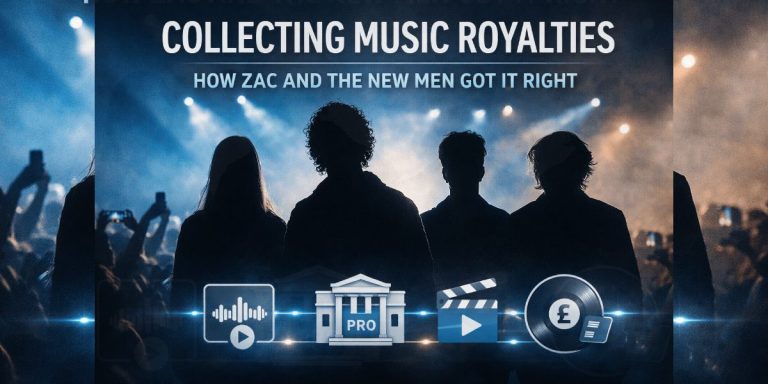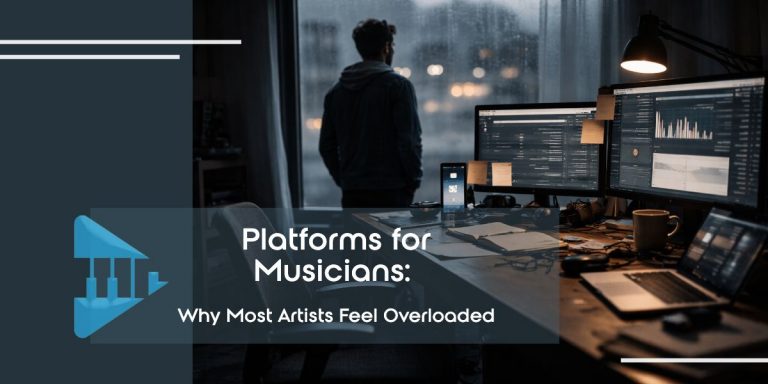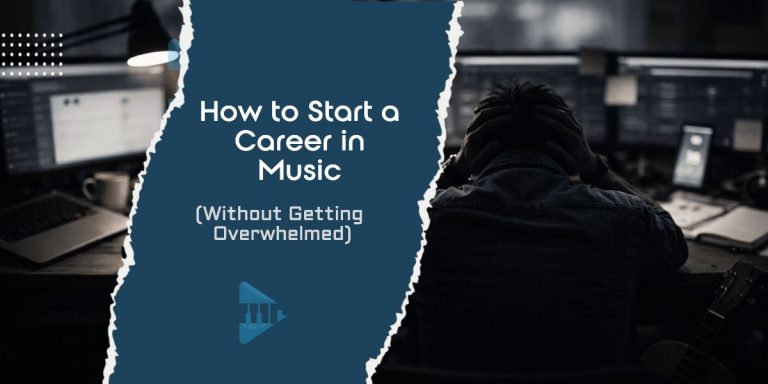Key Takeaway:
Royalties are how artists get paid — but many independent musicians are missing out on income simply because they don’t understand how the system works or haven’t registered their music properly. This beginner’s guide breaks down what music royalties are, how they work, and how to start collecting every penny you’ve earned — with a focus on music royalties explained in the UK.
📌 Table of Contents
ToggleLinks:
- How Much Do Songwriters Get in Royalties?
- 4 Types of Music Royalties Explained
- How to Register Your Music
- Melody Rights Blog
What Are Royalties in Music?
A Beginner’s Guide for Independent Artists in 2025
Introduction- What are royalties in music?
You made the track. It’s streaming. It’s getting love.
But are you getting paid?
If you’ve ever wondered how do music artists make money?— or why you’re seeing plays but not payments — you’re not alone.
Music royalties are how your songs turn into income. But for most indie artists, that income slips through the cracks.
The system’s messy, fragmented, and slow. But this guide will help you make sense of it — and make sure your royalties land where they belong: in your account.
Let’s dig into the types of royalties, the agencies involved, common traps to avoid, and how to make sure your money finds its way home.
What Are Music Royalties?
Every time your music is played, streamed, downloaded, or performed — it earns money. That money is called royalties.
Whether it’s spinning on Spotify, synced in a Netflix show, or booming in a local club, someone’s making money from your track.
And if your rights aren’t set up properly, that someone might not be you.
You earn royalties in different roles:
- As a songwriter (you wrote it)
- As a composer (you scored it)
- As a publisher (you control the composition)
- As a recording artist (you recorded the master)
Royalties don’t usually hit in lump sums. They trickle in as micro-payments — fractions of pennies that add up across time and territories.
But only if your music is registered, tracked, and credited properly. The more you understand the flow of those payments, the better you can track and claim them.
A Simple Breakdown of Music Royalties: The Four Main Types Every Artist Should Know

🎧 Here’s the quick breakdown — and the foundation for answering the question: what are royalties in music?
Performance Royalties – Earned when your music is played publicly: radio, TV, streaming platforms, or live events.
Collected by PROs (Performance Rights Organizations) like PRS (UK), ASCAP, or BMI (US). These are triggered every time your music is performed or broadcast.
Mechanical Royalties – Earned when your music is reproduced, either by physical manufacturing (CDs, vinyl) or through digital platforms (downloads and streams). But here’s the critical distinction — not all mechanicals are the same.
Physical Mechanical Royalties – Triggered when your music is physically manufactured, like on CDs or vinyl.
Collected by: MCPS (UK), Harry Fox Agency (US)
Digital Mechanical Royalties – Triggered by interactive digital uses, like streams or downloads on platforms such as Spotify or Apple Music.
Collected by: The MLC (US)
Distributors do not collect these royalties for you — and neither do PROs. If you’re not registered with the right agencies, you’re not getting paid.
Sync Royalties – Generated when your music is synced to video content: films, ads, games, or shows.
Typically negotiated upfront through sync licensing deals. Payouts vary widely depending on usage, territory, and platform.
Print Royalties – Earned from the sale of sheet music.
Less common for modern indie artists, but still relevant in classical, educational, and worship markets.
💡 Each royalty stream flows through a different system. If you’re not registered and tracking them correctly, you’re leaving money behind.
Want the deep dive? 4 Types of Music Royalties Explained
Composition vs. Master Rights
Every track has two sides — like two keys to two different vaults:
Composition Rights – Cover the melody, lyrics, and written musical work. These are usually owned by the songwriter(s) and publisher(s). This is the blueprint of your song — the intangible idea.
Master Rights – Cover the actual recorded version of the song. These are typically owned by the artist or label who funded the recording. This is the finished product — the version people hear.
If you wrote and recorded the track yourself, you likely own both. But if you’ve collaborated, signed a label deal, or left out proper agreements, these rights may be split — or worse, unregistered.
🔁 Example: An artist owned 100% of their master but forgot to register their publishing. The song got radio play — but the PRS payments went nowhere. Thousands missed, just like that.
Understanding these two rights isn’t just paperwork — it’s power. It means:
- You register correctly
- You get paid from all sides
- You can negotiate smarter with collaborators and labels
Don’t just make the music. Own the rights to it.
How Are Music Royalties Collected (and By Whom)?

Royalties don’t just land in one place — they’re split between systems, agencies, and countries. If you don’t know who’s supposed to pay you, you probably won’t get paid.
Here’s how the pieces come together:
Performance Rights Organizations (PROs)
- Examples: PRS (UK), ASCAP, BMI (US)
- Collect performance royalties when your music is played on radio, TV, streaming services, or live venues.
- These apply to the composition side of your work (the song, not the recording).
Mechanical Rights Agencies
- Examples: MCPS (UK), The MLC (US), Harry Fox Agency
- Collect mechanical royalties for reproductions — streaming, downloads, CDs, and vinyl.
- Covers both digital and physical usage.
SoundExchange
- Specializes in collecting digital performance royalties from non-interactive platforms (e.g., Pandora, SiriusXM).
- Applies to the recording (master) side — crucial for artists who perform on recordings but didn’t write the song.
PPL (UK)
- Collects neighboring rights for performers and master owners when a track is played in public spaces or broadcast.
Important: Different countries = different royalty systems. A stream in Brazil won’t earn you a penny unless your rights are registered there.
Tool Tip: Use a global rights dashboard to track all registrations in one place. Melody Rights makes this automatic.
Read more: How to Register Your Music
Why Music Royalties Take So Long to Pay Artists
Your song played on TV six months ago. A year later, you’re still waiting for a payout.
You’re not alone — sync royalties (and even streaming royalties) often move like molasses.
Here’s why the system drags its feet:

🎙️ Industry Insight – Bobby Cole, Melody Rights Founder:
“Some of these royalty organizations are over 80 years old and still operate on outdated systems. Even when a TV show licenses your music, you often wait months — or even years — to get paid.”
Typical Royalty Timeline (TV Sync)
- License deal signed: 3–6 months
- Cue sheet submitted: 2–3 months after airing
- Collection agency processes data
- Agency pays out: Quarterly or biannually
- Final payout to artist: Often 12–18 months later
That’s if everything goes smoothly.
A missing cue sheet or incorrect metadata can delay it even further — or wipe your royalty out completely.
Melody Rights helps close that gap. We track cue sheets, monitor payment cycles, and flag missing metadata so your royalties don’t get stuck — or lost.
Common Royalty Mistakes (and How to Avoid Them)

Common Royalty Mistakes (and How to Avoid Them)
Even with great music, it’s easy to miss out on money because of paperwork, assumptions, or timing. These are the slip-ups we see over and over:
❌ Not registering with a PRO
(e.g. PRS, ASCAP, BMI — no registration = no performance royalties)
❌ Missing or incorrect metadata
(ISRC codes, songwriter splits, wrong titles — this breaks the money trail)
❌ Assuming distributors collect everything
They only cover digital distribution — not performance, mechanical, or sync royalties.
❌ No international registration
Your music could be getting played abroad, but if you’re not registered globally, you’re not getting paid.
❌ Forgetting to register co-writers or producers
If you leave them off, their share can block yours — or worse, someone else claims it.
❌ Leaving royalties unclaimed
Many royalties have a claim window of just 2–3 years. After that, they disappear.
Melody Rights fixes the stuff that costs artists thousands — metadata, missed splits, forgotten registrations. We plug the leaks so your royalties find their way home.
How Melody Rights Simplifies the Process
Royalties shouldn’t be this hard to track.
You shouldn’t need spreadsheets, guesswork, or 10 different logins to collect what you’ve earned.
Melody Rights turns the chaos into a clean, automated system that works in the background while you focus on making music.
✅ One-time setup, full global registration
✅ One dashboard to see everything you’re owed
✅ No cuts taken — 100% of your royalties go to you
✅ Covers new platforms and future-proof distribution
Whether you’ve dropped one track or your whole catalogue, Melody Rights makes sure your royalties show up — accurately and on time.
Royalties vs. Publishing: What’s the Difference?
Publishing = owning the rights to your song. Royalties = the money you earn from people using it.
You can own your publishing and still miss out on royalties if your music isn’t registered properly. That’s where things fall apart for a lot of artists.
Melody Rights manages both sides — so your rights are protected, and your royalties show up.
Music Royalties FAQ: Real Answers, Fast
Royalties in music definition: What does it mean?
You earn royalties every time someone streams, sells, performs, or broadcasts your music. They’re how music rights turn into income.
How do royalties in music work?
When someone plays or uses your music, that usage triggers a royalty. Different organizations (like PRS, PPL, or The MLC) collect the money and pay it out to you — the rights holder — based on how the track was used.
How much does a song make in royalties?
It varies wildly.
1 million Spotify streams = around £2,000–£3,000
A sync in a Netflix show = £500 to £10,000+
It depends on usage, rights splits, and registration.
Are music royalties forever?
Not exactly.
Your copyright — the legal right to your song — lasts for your lifetime plus 70 years (in the UK). That means your music can keep earning for decades.
But the royalties themselves? They don’t wait around.
Most royalty organizations only hold unclaimed payments for 2 to 3 years. If you haven’t registered or submitted the right info, that money can expire — and you lose it.
So while your rights last, the clock on getting paid doesn’t.
How are royalties paid?
Usually quarterly — but often much slower. Sync payments can take 12–18 months. Metadata errors or missing registrations can delay things even longer.
What’s the difference between publishing and royalties?
Publishing means you own the rights to your song (the composition). Royalties are the payments you earn when that song is used. You can own your publishing and still miss royalties if your data or registrations are off.
What is metadata in music royalties?
It’s the digital fingerprint of your track — things like ISRC, IPI, songwriter splits, and song titles. If metadata is missing or wrong, your royalties won’t find you.
Can independent artists collect their own royalties?
Yes — but you have to be registered in all the right places.
Distributors don’t cover everything. You still need to register your music with PROs, The MLC, and international agencies if you want to get paid fully.
How does Melody Rights assist with music registration and royalties?
Melody Rights simplifies the whole process — from metadata to global registrations. We make sure nothing slips through the cracks, so you collect everything you’ve earned.
Industry Insight:
Did you know?
Artists leave an estimated $500 million in royalties unclaimed each year, mostly due to bad metadata, missing registrations, or not knowing the system.
Final Thoughts & Next Steps– What Are Royalties in Music?
By being proactive and informed about song royalty payments, artists can maximize their earnings and navigate their careers more effectively.
Don’t Leave Money on the Table
Royalties are your paycheck — and most artists aren’t collecting all they’ve earned. But with the right tools, you can fix that.
✅ Register your music
✅ Clean your metadata
✅ Track your rights
✅ Use Melody Rights to simplify it all
Ready to Get Paid Properly?
Your music is already out there. Let’s make sure your money is, too.



